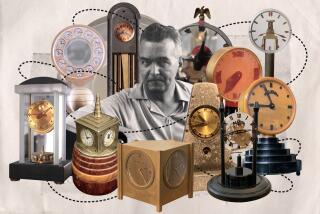Rogues’ Gallery
- Share via
Allen Kurzweil has written an erudite entertainment that suits his name, which means “pastime” in German. Like his first novel, “A Case of Curiosities,” published in 1992, “The Grand Complication” is studded with fascinating mechanical trivia from the 18th and 19th centuries. The author and his characters like watches, the mechanical dolls called automata and all sorts of curious inventions that open and close, revealing and concealing their treasures by means of exquisitely configured gears and levers. The curiosities case, a glass-fronted cabinet with niches for a collection of objects, is passed on from owner to owner, from the first novel to the second, to end up in the hands of one Henry James Jesson III. One of the niches is empty; Henry wants to find the missing piece and restore it to its place. As he explains to the amateur sleuth he hires, “An incomplete case makes for an incomplete story and that’s something I detest.”[82]
The unlikely detective is Alexander Short, librarian in a New York research library, who is fascinated by enclosures, loves the Dewey Decimal System and is a devotee of Dr. Johnson. He’s always in trouble with his punctilious bosses and has no better luck at home. His beautiful French wife, Nic, a designer of pop-up cards and books, can’t arouse him even when she poses languidly in a bodysuit with a bull’s-eye in the strategic place. She is jealous of his preoccupation with Jesson and warns Alexander that betrayal is in the offing.
But he is smitten with Jesson from the moment the eccentric old man requests the book “Secret Compartments” from him. Alexander turns to his journal, made for him by Nic on the model of the girdle book that medieval monks attached with string to their robes. His compulsive notes and lists form a kind of homage to Melvil Dewey’s system. There is “a catalog of a tenement hallway, filed under H ... the seating choices of notable readers (this is where I documented Jesson before reassigning him to the Js), favorite library sounds, a register of Nic’s paper creations, observations on forms of enclosure.” He and Jesson pore over “The Book of Hours,” an 18th century chronicle Alexander steals from the library’s conservation department, which is run by his archenemy, Irving Grote. It narrates “the life of a mechanical engineer through a collection of objects housed in a glass-fronted cabinet.” It is Jesson’s case, and an engraving shows a pocketwatch in the now-empty niche--supposedly commissioned for Marie Antoinette. The sleuths trace it to a Jerusalem museum, from which, unfortunately, it was stolen in 1983. It hasn’t been seen since.
As their hunt continues, Alexander begins to have doubts about Jesson. In a search of the latter’s apartment to retrieve “The Book of Hours” and return it before Grote discovers its theft, he comes upon a schoolhouse clock, which he opens to find a manual for the “roll-player,” a mechanical reading machine. In another place he finds a roll of paper. When he attaches it to the reading contraption, he discovers that Jesson wants more than the watch. His text is a historical novel-in-progress and, to flesh out the protagonist, an 18th century engineer, Jesson is appropriating, stealing in a sense, Alexander’s life. Jesson is a bogus Dr. Johnson who has been feeding on his Boswell, manipulating him.
It’s not as horrible as it sounds, since this is a good-humored and often humorous mystery. But it’s not a compelling mystery either. It’s actually quite easy to keep from turning the pages. Kurzweil’s pacing is an amiable amble in a gallery of delightful caricatures and bizarrely charming objects. The reading pleasures here are all in the odd facts and the set-piece scene. My favorite of the latter is the library staff party, which begins with a rousing “Call Slip Race” and features a tense competition on Dewey identifications between Grote and Mr. Paradis, a janitor with a passion for classification. The party ends with a bacchanal led by “The Lord of Misrule.”
The novel should have ended on that boozy high note but instead limps off with an arch private joke. Kurzweil is overly fond of his puns and his embedded things-within-things and books-within-books. Many of his sly jokes work only if you’ve read the earlier novel. In my library catalog, “The Grand Complication” will be filed under Delicious Confection, a bit too runny.
More to Read
Sign up for our Book Club newsletter
Get the latest news, events and more from the Los Angeles Times Book Club, and help us get L.A. reading and talking.
You may occasionally receive promotional content from the Los Angeles Times.









